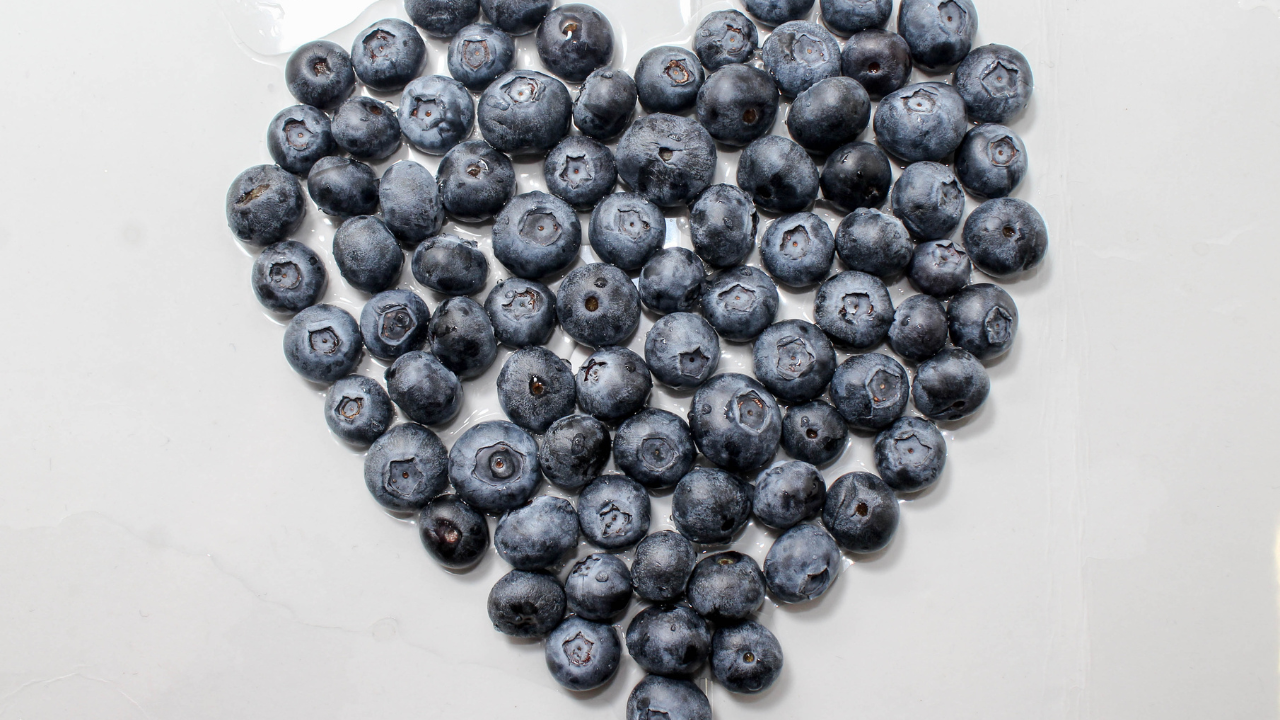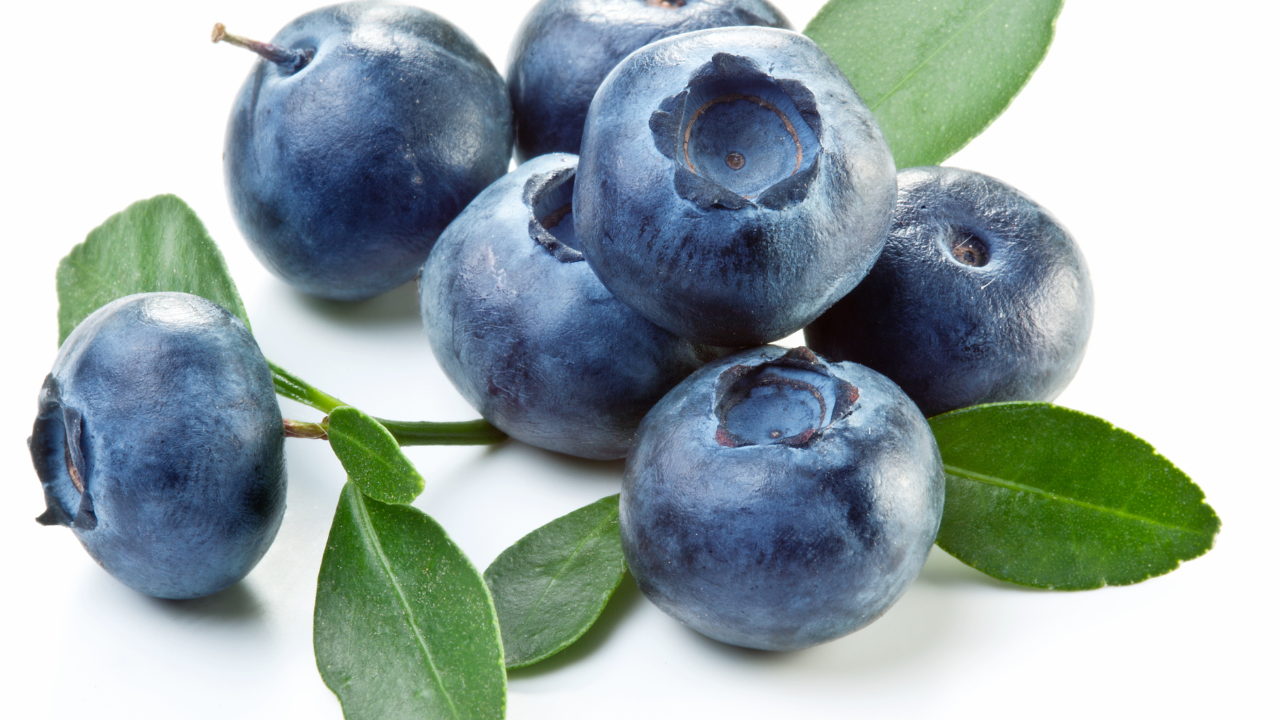Loaded with vitamins, minerals, and antioxidants, the advantages of blueberries seem limitless.
Blueberries are small, round, bluish-purple fruits commonly known as berries. Regular consumption of blueberries has been shown to reduce chronic disease risk, improve cholesterol levels and cardiovascular health, and reduce high blood pressure, among other health benefits.
Renowned for their juicy texture, blueberries possess a balanced flavor profile that is sweet and tart and nearly seedless—qualities that enhance their popularity. These fruits are cultivated across various regions, including North America, South America, Mexico, Canada, and other locations globally, with closely related species found in Eurasia. The harvesting period for blueberries in the United States typically spans from April to September.
Blueberries may be consumed fresh or dried. They are nutrient-dense and serve as a flavorful and healthful snack option.
Blueberries come in various types, such as highbush and wild lowbush. Despite minor differences in size, flavor, and antioxidant content, all blueberries provide essential nutrients, including dietary fiber, iron, vitamin K, vitamin C, and beneficial polyphenols.
Additionally, to further understand healthy eating, consider the advantages of another small but mighty fruit; check out 8 Science-Backed Benefits of Eating Grapes.
Nutrition info on blueberries
According to the USDA, one cup of raw, juicy blueberries nourishes your body with:
One cup or 148 grams of blueberries contains:
- 84.4 calories
- 1.1 grams of protein
- 0.488 grams of fat
- 21.5 grams of carbohydrates
- 3.55 grams of fiber
- 14.7 grams of sugar
- 8.8 milligrams of calcium
- 8.8 milligrams of magnesium
- 17.8 milligrams of phosphorus
- 114 milligrams of potassium
- 14.4 grams of vitamin C
Blueberries are also a source of vitamin A, vitamin B6, vitamin E, vitamin K, manganese, folate, and choline. The deep bluish-purple hue of blueberries is due to their high content of anthocyanin pigments. These antioxidants are responsible for the blue color of blueberries. They are beneficial for your health.
What are the health benefits of blueberries?
Here are 12 Proven ways eating blueberries may benefit your body and health, backed by science.
I. Blueberries are nutrient-dense but low in calories.
The blueberry bush (Vaccinium sect. Cyanococcus) is a flowering shrub that grows small, bluish-purple berries called blueberries. These berries are related to cranberries and huckleberries. They range in size from 0.2–0.6 inches in diameter and change from green to purple and blue as they ripen. There are two main types of blueberries: highbush blueberries, commonly grown in the US, and lowbush or “wild” blueberries, which are smaller and have more antioxidants.
Blueberries are a healthy choice because they are packed with nutrients. A 1-cup (150-gram) serving gives you 13% of your Daily Value for fiber, 14% for vitamin C, and 24% for vitamin K. Blueberries are about 85% water, have only 84 calories, and contain 21.5 grams of carbohydrates per cup.
2. Blueberries are rich in antioxidants.
Blueberries are rich in essential vitamins and minerals and contain phytonutrients known as polyphenols. This category of polyphenols includes anthocyanins, which are the compounds responsible for the striking blue color of blueberries. These compounds provide blueberries with their unique natural hue, and anthocyanins also function as antioxidants.
Wild blueberries possess 33% more anthocyanins than regular blueberries; however, all blueberries offer a substantial amount of this natural compound. Anthocyanins have various health benefits, including anti-diabetic, anti-inflammatory, and anti-cancer properties. Additionally, they have been connected to a lower risk of developing cardiovascular diseases.
3. Blueberries can boost cardiovascular health and help prevent heart disease.
Cardiovascular disease is a serious health issue and the leading cause of death in the US, according to the CDC. Many factors can increase our risk, but our diet is important. Quitting smoking, exercising regularly, and maintaining a healthy weight are all great ways to support heart health.
Eating certain foods, like blueberries, can also help protect your heart. A 2019 American Journal of Clinical Nutrition study found that people with metabolic syndrome—characterized by obesity, high blood sugar, and low HDL cholesterol—who ate about one cup of blueberries daily showed better heart health. They had increased HDL cholesterol (the “good” cholesterol) levels and reduced their risk of cardiovascular diseases by up to 15%.
Another study published in Food & Function noted that foods high in anthocyanins, like blueberries, are linked to a lower risk of cardiovascular disease.
4. Blueberries support brain health by maintaining function and improving memory.
Blueberries are good for brain health because they contain antioxidants. A 2018 study found that older adults with memory problems had increased brain activity when they ate blueberries. In another study from 2022, older adults who drank wild blueberry juice every day for six months showed improvements in thinking and processing speed.
The antioxidants in blueberries, called anthocyanins, may help brain function by reducing inflammation, increasing blood flow, and improving communication between brain cells. Research shows that children aged seven to ten did better on tasks after drinking wild blueberry juice. Older adults also showed better working memory after consuming anthocyanins.
While more studies are needed to confirm these benefits, adding blueberries to your diet is safe. You can easily enjoy them by putting them on oatmeal or blending them into smoothies.
5. They can aid in glucose management.
One advantage of blueberries is their ability to enhance glucose regulation after meals, possibly due to their impact on the digestive system. Additionally, research examining three different types of anthocyanins indicated that blueberries might promote insulin secretion, a frequent issue for individuals with type 2 diabetes.
6. Blueberries may modulate your insulin response.
Insulin resistance happens when cells do not respond well to insulin, the hormone that controls blood sugar levels. This can lead to high blood sugar and may cause type 2 diabetes. While many people cut back on sugar, some avoid fruit, which isn’t always a good idea. For example, fruits like blueberries can help manage blood sugar.
A study in *Current Developments in Nutrition* found that eating one cup of blueberries every day can lower triglyceride levels in people with type 2 diabetes. This may reduce the risk of heart disease. Another study showed that people who drank smoothies with blueberries had better blood sugar responses to insulin than those who did not consume blueberries.
7. They may help lower blood pressure.
Reducing sodium intake is well-known for lowering blood pressure, but eating blueberries can help too. High blood pressure can lead to heart problems and stroke. Eating a cup of blueberries daily may help reduce blood pressure and improve blood vessel health, especially in postmenopausal women. Blueberries may relax blood vessels and lower blood pressure due to their antioxidants, which regulate nitric oxide and prevent cellular damage and inflammation.
In an eight-week study, obese people at high risk for heart disease saw a 4–6% decrease in blood pressure after eating freeze-dried blueberries every day for eight weeks.
8. Pregnant women may have a lower risk of gestational diabetes.
Gestational diabetes can occur for many reasons, some of which a person cannot control. However, studies suggest that what pregnant women eat may influence their risk of developing this condition.
Specifically, research shows that pregnant women who ate 280 grams of blueberries each day and 12 grams of soluble fiber as a supplement had a lower risk of developing gestational diabetes. Additionally, those who included blueberries and fiber in their diet gained significantly less weight than those who did not.
9. Blueberries may help protect against aging and cancer by reducing DNA damage.
Every day, our cells experience oxidative DNA damage. This damage happens in every cell in your body and is a part of why we age. It also plays a role in diseases like cancer.
Blueberries are rich in antioxidants, which may help reduce some free radicals that harm your DNA. However, more research is needed to confirm this connection.
10. Blueberries can help reduce muscle damage from intense exercise.
Strenuous exercise can cause muscle soreness due to inflammation and oxidative stress. A small 2018 study suggested that blueberry supplements may reduce this damage and improve performance. However, more research is needed to confirm these effects.
11. Regulates blood sugar levels and helps manage diabetes and obesity.
Eating blueberries every day can help people with diabetes control their blood sugar. They improve insulin sensitivity and are high in fiber, low in sugar, and low in glycemic index, so they don’t cause a significant rise in blood sugar levels. Research shows that freeze-dried blueberries can help prevent obesity by reducing inflammation and the buildup of fat cells. The fiber in blueberries also helps people feel full, making them a tasty and healthy snack for those with diabetes and obesity.
12. Promotes gut health
Blueberries are known for being high in fiber. This helps prevent constipation and keeps the digestive system healthy. They also allow good bacteria to grow in the gut, essential for digestion and immune health. Studies show that drinking a wild blueberry beverage daily for six weeks can increase the growth of beneficial gut bacteria, like Bifidobacteria.
13. It helps maintain healthy bones.
Blueberries are rich in essential nutrients, including calcium, phosphorus, magnesium, and vitamin K, which collectively support bone health. Research involving animal models has indicated that blueberry consumption may enhance bone health and mitigate bone loss in rats. Furthermore, a laboratory study has suggested that blueberries could facilitate improved bone marrow production.
How can you include blueberries in your diet?
You can easily find blueberries in stores. They come fresh, dried, freeze-dried, frozen, or canned. Blueberries are versatile—add them to drinks or desserts.
Here are some simple ways to include blueberries in your diet:
– Make a blueberry smoothie or milkshake.
– Prepare blueberry jam or compote.
– Mix them into a fruit salad.
– Create blueberry ice cream.
– Use them as a topping on cereal, yogurt, or salad.
– Bake a blueberry pie.
– Enjoy them in fruit crumble, pancakes, muffins, or other desserts.
You can also eat a cup of fresh or dried blueberries as a snack. Be sure to add them to your meals for great flavor and health benefits.
The bottom line
Blueberries are a healthy and nutritious snack that may boost heart health and brain function and offer various other benefits for the body.
Sources referenced in this article
https://www.ncbi.nlm.nih.gov/pmc/articles/PMC5613902/
https://www.ncbi.nlm.nih.gov/pmc/articles/PMC4665526/
https://fdc.nal.usda.gov/fdc-app.html#/food-details/1102702/nutrients
https://pubs.acs.org/doi/abs/10.1021/jf060300l?journalCode=jafcau+
https://academic.oup.com/ajcn/article/109/6/1535/5499342
https://pubmed.ncbi.nlm.nih.gov/31776541/
https://www.ncbi.nlm.nih.gov/pmc/articles/PMC6093614/
https://www.tandfonline.com/doi/full/10.1080/1028415X.2022.2117475
https://pubmed.ncbi.nlm.nih.gov/27043127/
https://pubmed.ncbi.nlm.nih.gov/28283823/
https://www.ncbi.nlm.nih.gov/pmc/articles/PMC8147004/
https://pubmed.ncbi.nlm.nih.gov/26250485/
https://academic.oup.com/cdn/article/4/4/nzaa030/5800977
https://pmc.ncbi.nlm.nih.gov/articles/PMC5927356/
https://pmc.ncbi.nlm.nih.gov/articles/PMC5927356/
https://fdc.nal.usda.gov/food-details/171711/nutrients
https://ajcn.nutrition.org/article/S0002-9165(23)46300-9/fulltext






